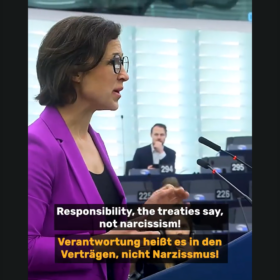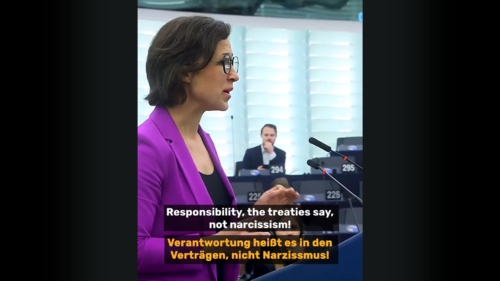“This year I’m running the marathon!” – a proud New Year’s resolution, but not mine. Nevertheless, January demanded some stamina from me and immediately started with a marathon of interviews: While events in Iran and Iraq were tumbling over, I was asked to assess the situation for various national newspapers. I also accompanied the topic in my parliamentary work. Alongside Europe’s future and the Green Deal, the US-Iran conflict was one of the most important debates during the week of the Strasbourg part-session, both for my group and for the people on the ground. Back in Brussels it was time to say goodbye. With deep embraces and big tears. Carried by the hope that one day the British people will return. Now it is time to start negotiations. It will remain complicated.
Interview Marathon: USA-Iran conflict and the situation in Iraq
The killing of the Iranian General Soleimani by the Americans was the beginning of a wildfire that threatened to completely destabilize the Middle East. And it put the new EU Commission, which describes itself as “geopolitical”, to its first test. It did not pass this test particularly well, I commented in the Spiegel. In particular the one-sided reminders from von der Leyen to Iran do not result in the EU being perceived as independent. A “Geopolitical Commission” must not be an appendix to the USA, I explained in interviews with the Handelsblatt and the Süddeutsche Zeitung. In it, I demanded that the EU intervene as an independent mediator and also address the needs of Iraqis. As I experienced myself during my journey in October, many people in Iraq want a reduction of influence from the conflict parties Iran and USA in their country. Calls for the EU to stand up for the rights of these people are getting louder, as are the protests on Baghdad’s streets. But it is not only the Iraqis who are demonstrating. Even the Iranians are no longer putting up with everything, as I explained to the Redaktions Netzwerk Deutschland and in an exhaustive interview with the Heinrich Böll Foundation.
Besides the riots in the Middle East, there was a spark of hope for Libya at the beginning of the month. At the Berlin conference convened by the German government, a cease-fire was agreed upon by the conflicting parties in the North African coastal country. Here too, the EU is to mediate, but so far its performance has not been convincing. The agreed arms embargo has apparently already been broken while a mechanism for its control is still being discussed in the capitals. And the interests of the people in Libya, as well as the catastrophic situation in the refugee camps, have been largely left out of the discussion. They did not even sit at the negotiating table, as I explained in my interview with Deutsche Welle.
Strasbourg
The plenary week was, as expected, very packed. I had to make three speeches in one day. But other Green MEPs were also very busy and we were able to get some things through. For example, our demands for the Green Deal: higher standards for biodiversity, especially in agricultural policy, and funding linked to the Paris climate targets and the coal phase-out. In addition, we were able to set the course for a reform that will give the Parliament more capacity to act and the EU citizens more participation. A conference on the future of Europe will discuss, among other things, the further democratization of the EU.
I myself, of course, also campaigned in Parliament for conflict resolution in the Middle East. In my speech on the US-Iran conflict I called on the EU to listen to the demonstrators in Iraq and Iran and to stand up for their rights As the EU Annual Report on Human Rights shows, the EU has quite different ways of doing something for human rights, including preventive measures. The report shows how our policy affects people all over the world. And often for the worse. In my speech I called for the preservation of human rights to be consistently made the top priority of our foreign policy.
https://www.facebook.com/HNeumannMEP/videos/518877225410176/]
However, the annual report on security policy shows that many EU foreign policy concerns itself primarily with military armament. Arnaud Danjean (EPP Group) tabled a report calling for strategic autonomy for the EU rather than partnership and multilateralism. This should be achieved primarily by military means. About 90% of the report deals with military issues, structures and industry. We should at least equally promote our civilian missions in order to continue to provide security in and around Europe without weapons and violence in the future. As shadow rapporteur for the Greens/EFA Group I criticised the report. Because it ignores European treaties which lay down an appropriate mix of military and civilian measures and because it uncritically whitewashes our own military operations.
Farewell
The last week of January in Brussels was sad. We voted in favour of the EU’s Withdrawal Agreement with Great Britain, thus finally sealing the Brexit. Why did we have to do this? To prevent a hard Brexit and to give Europe the chance to finally wake up from this nightmare and look forward. And by Europe, I also mean Britain! Because even when the British have left the EU, there will still be strong cohesion. And more than that, there remains a shared vision of a future in which parliamentarians from all European countries will stand side by side. This was clearly noticeable this week. Whether at the farewell of our group (see cover picture) or at the probably largest choir that has ever sung in parliament (goose bumps!):
https://www.facebook.com/HNeumannMEP/videos/472302640346814/]
Outlook
What has the Brexit taught us? There is a high level of dissatisfaction with the EU. I hope we can draw from this the energy to change things fundamentally. With the conference on the future of Europe, we are laying the foundations for this and I would like to take the format to Berlin.
Furthermore, this year I want to strengthen the role of women in the EU’s foreign and security policy. After all, women belong at the negotiating table and their concerns must be given much greater consideration in our projects. As one of the two rapporteurs for the report “Gender Equality in EU Foreign and Security Policy”, I hope to make some improvements here. In late January I met with a number of different experts to discuss ideas for a feminist foreign policy of the EU. Because the report should be as meaningful and comprehensive as possible. After all, it is not only the year of Brexit, but also the 20th anniversary of Resolution 1325, by which the UN called on all its members to defend women’s rights and to include them equally in peace negotiations. A strong report for a feminist EU foreign policy is only fitting for this anniversary and I am pleased to be able to work on it. And I will of course keep you informed on this in all channels.












